
A possible justification for the role of the bombings is Japan’s subsequent surrender, but this is more than doubtful, though the view that the bombings helped end the war in the months leading up to them, saving many American soldiers that would have otherwise been lost if military operations had continued, dominates in the U.S. Yet this evaluation of the military use of WMD by Washington is very difficult to find outside the U.S., and especially in Japan, though Tokyo avoids official condemnation of Washington, which has now become a “reliable ally”.
Two years after the end of World War II (in 1947), a Constitution was adopted in Japan, forbidding the country to have an army and use military force as a means of settling international conflicts. This article has not been nullified yet. At that time, there were good reasons to expect that the country, which had felt the pain of the use of WMD first hand, would support a peaceful international policy and not tolerate the presence of militarist sentiments in its society.
Over the past decade, Japan has not only restored the damage done to the country by the atomic bombings, but has also become an economic giant, actively spreading its influence around the world. In parallel, the Japan of recent years, for various reasons, has built up its military capabilities. The revival of Japanese militarism has been deliberately facilitated by the United States, especially by the current White House administration, as part of its “pivot to Asia”, prompting Japan to engage in a more aggressive position in northeast Asia and the strengthening and modernization of the national armed forces.
In an effort to circumvent the provisions of the Constitution that limits “self-defense forces” to defending Japanese territory, today Tokyo has already officially warranted “pre-emptive strikes against an enemy” as a means of “self-defense” against potential threats outside the country. Japanese politicians have increasingly begun making irresponsible statements, attempting to revise history and the lessons of the Second World War, as well as demanding a return of “disputed territories”. These actions can only arouse neighboring Asian countries and the international community’s anxiety and attention in relation to such tendencies in Japan’s development.
The transformation of Japan’s policy of “defense” recently has been clearly demonstrated by the so-called “White Paper”, an event held every year since 1976, where national administration officials evaluate the military-political situation in the world and outline the main aims of the country’s military policy for the coming year.
At the beginning of this July, Japanese National Defense officials handed down another endorsement of the “White Paper” to the Cabinet of Ministers. Its main feature was the dangerous challenges and threats Japan faces, which include, in particular, the nuclear tests and launching of medium-range missiles by North Korea as well as China’s expansion, which includes the “penetration of Japanese airspace and territorial waters”.
The authors of the report also didn’t fail to note the concerns arisen by the “significant size of the Russian armed forces” in the region.
In referring to such “adverse conditions”, official Tokyo is trying to justify the government’s decision about the significant increase in the military budget of the country during the last 11 years, the initiation of the process of reviewing the foundation of the national military program, and the establishment of the National Council of Defense under the control of the government of the country in 2013. It underlines the importance of Japan’s military cooperation with the United States, which was given a separate and fairly large section in the new report.
The strengthening of Japanese defense is very clearly related to the U.S. military buildup against China: U.S. bases in Japan have already figured into the Pentagon’s secret plans, including air and missile attacks against military bases and communication systems in China, in addition to a naval blockade. Tokyo’s official policy of developing and strengthening military ties with the United States has repeatedly provoked significant protests by the Japanese population, in particular with regard to the decision to support the illegal U.S. invasion of Iraq and the deployment of the Japanese military.
According to many foreign observers, Washington’s policy of provoking an arms race in Asia, the rise of militarist sentiment in Japan, especially the revision of the results of the Second World War and the ignition of old territorial disputes, only serve to increase the risk of conflict in the region, which could be precipitated by the country of the Rising Sun.
But perhaps there is better to stop it in time, quiet down and remember all those killed in the recent military conflicts, and to have the strength to prevent new outbreaks of war?
Vladimir Odintsov, political commentator, especially for the online magazine “New Eastern Outlook”.